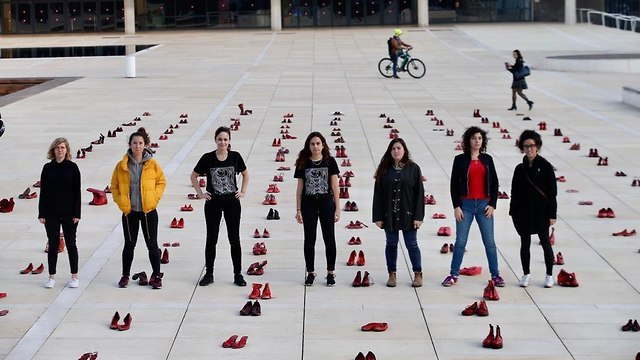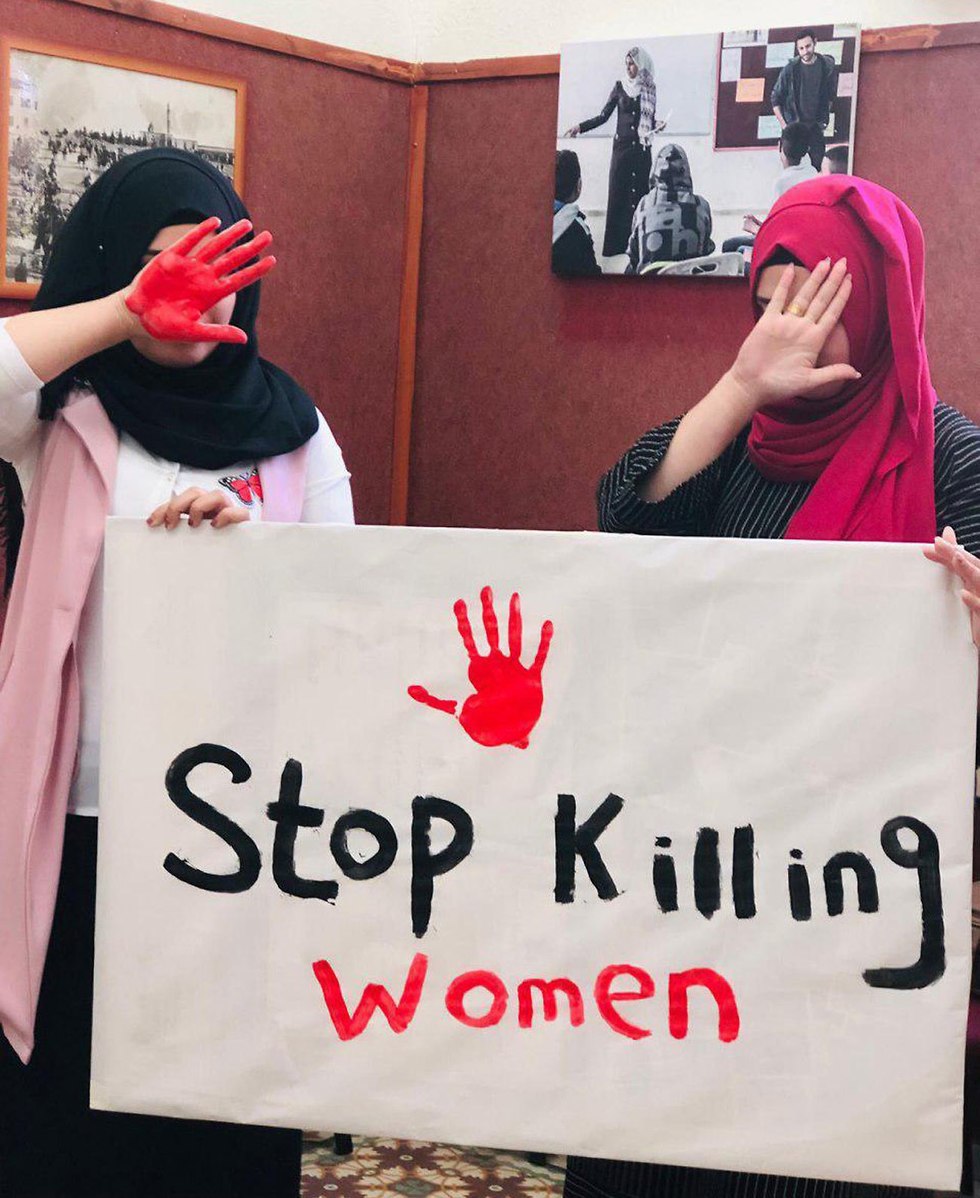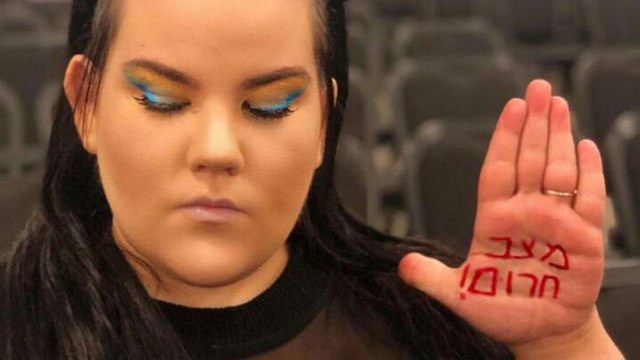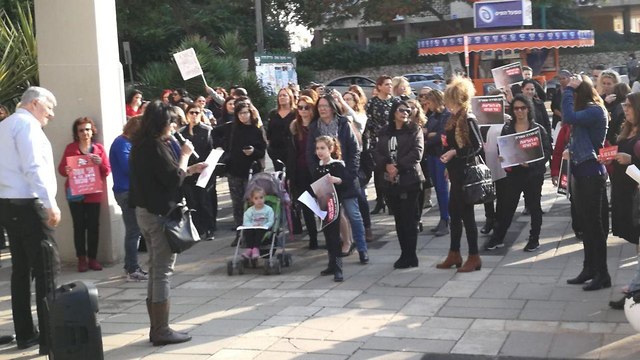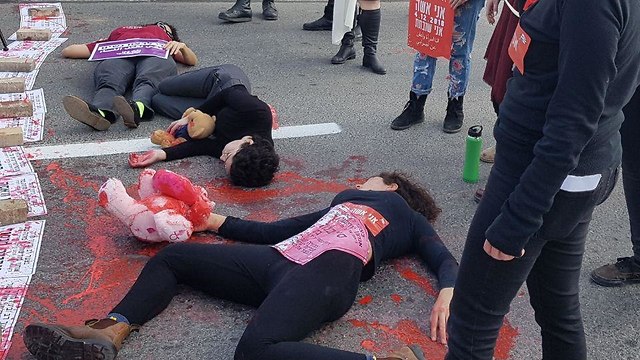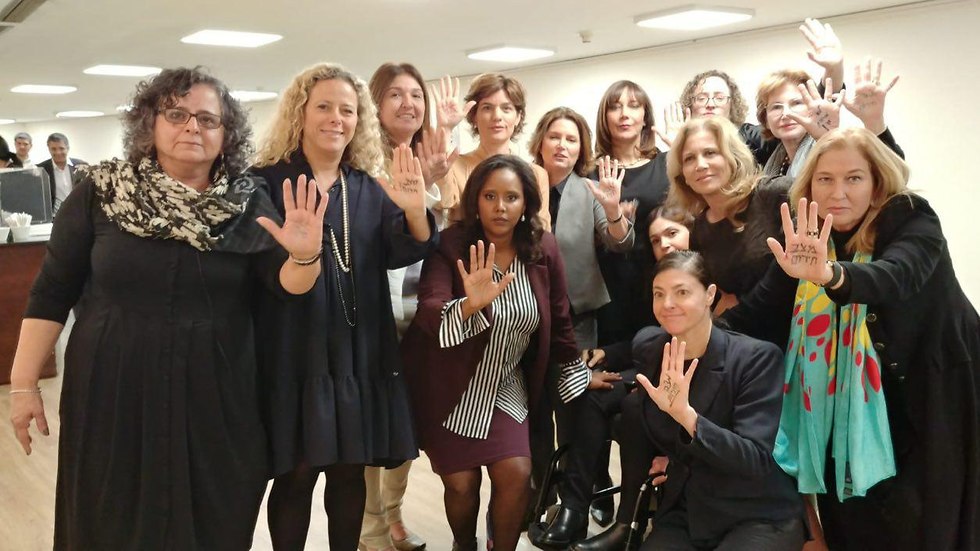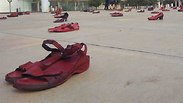
Women's strike in protest of domestic violence begins
Thousands of men and women take part in the nationwide protest against violence toward women; a display of hundreds of red shoes spread across Habima Square in Tel Aviv opens strike; Azrieli Junction in Tel Aviv closed to traffic, with demonstrators holding signs saying, 'Stop killing women.'
A nationwide strike in protest of violence against women was underway on Tuesday, with thousands of men and women calling on the government to take action against domestic abuse.
A jarring display of hundreds of red shoes spread across the Habima Square in Tel Aviv opened the day's events.
Protesters blocked central junctions across the country starting 9:30am, causing traffic congestion. The Azrieli Junction in Tel Aviv was the first to be blocked. Demonstrators gathered there, holding signs saying, "Stop killing women." In Jerusalem, 50 women blocked the entrance to the city, urging to "stop the murder of women." In Be'er Sheve, some 200 men and women gathered outside city hall.
At the Mount Scopus campus of the Hebrew University, signs with the names of the 24 women who were murdered over the past year were plastered on chairs with the writings: "Yara Ayub will no longer sit here. Who will be next?"
Dozens of female and male employees of the Hadera Municipality, alongside women's organizations in the city, took part in a 24-minute rally commemorating the 24 victims of domestic violence. A similar rally also took place in Herzliya.
Many demonstrations also took place in the Arab sector. Dozens of men and women in Tira, Qalansawe, and Tayibe protested this morning against the government's inaction on the issue of violence against women. They held photos of the victims, demanding to eradicate the killings.
Fifty third-sector and women's organizations joined forces, protesting the most deadly year since 2011, dubbing it "emergency situation." Many women, among them artists and actresses, shared their photos on social media with the caption "emergency situation."
Despite promises from municipalities that they would allow their employees to strike without missing out on the day's wages, the Civil Service Commission, the Finance Ministry and the Union of Local Authorities announced the strike would be considered a vacation day or be deducted from the salary of anyone who chooses to take part.
Nevertheless, 47 local authorities, 11 workers' unions, 84 companies, 51 firms and 65 small business pledged their support to the strike, including the President's Residence, Google Israel, Facebook Israel, Bank Hapoalim, KKL, the Histadrut Labor Federation, the Kibbutz Movement, the Hebrew University of Jerusalem, Teva Pharmaceutical Industries, and Maccabi Tel Aviv FC.
At 2 pm, protesters will put up a display commemorating sexual assault victims under the title "Every Woman Has A Name" at Habima Square and hold a rally where the names of the victims will be read out.
At 5 pm a demonstration will take place at Tel Aviv's Lewinsky Garden to protest of the violence against women in southern Tel Aviv.
At 7:30 pm, the main protest rally will be held at Rabin Square, to which shuttle services will arrive from all over the country.
Throughout the day, "Their right to strike"—a free legal counseling service hotline will be operated by the Israel Women's Network.
Ten days ago, a rally was held at Tel Aviv's Cinematheque plaza to mark the International Day for the Elimination of Violence against Women, with only a few hundreds of participants.
Since then two girls were brutally murdered— 16-year-old Yara Ayub from Jish and 13-year-old Eritrean native Silvana Tsegai from Tel Aviv. These two murders, in addition to the 22 additional women murdered since the beginning of the year, where what sparked the women's protest.
The protesters demand the government to allocate NIS 250 million promised for a five-year plan to fight violence against women, which was approved a year and a half ago.
The plan includes, inter alia, placing a social worker at every police station, putting ankle monitors on abusive men, establishing shelters for battered pregnant women, expanding rehabilitation programs for abusive men and resettling battered women abroad for their own protection.
The women's protest headquarters issued a statement, "We are making history. We are not only striking, we are showing real power and strength. We are proving we cannot be ignored and that we refuse to be the government's last priority."
"This demonstration of power is just the beginning of a historic move that will make the lives of women an issue that matters on the national agenda," the statement read.
"The fact that some 51 percent of the population do not count, nor receive resources and their basic needs are not met, is an outrage and we are stopping it," the statement concluded.










